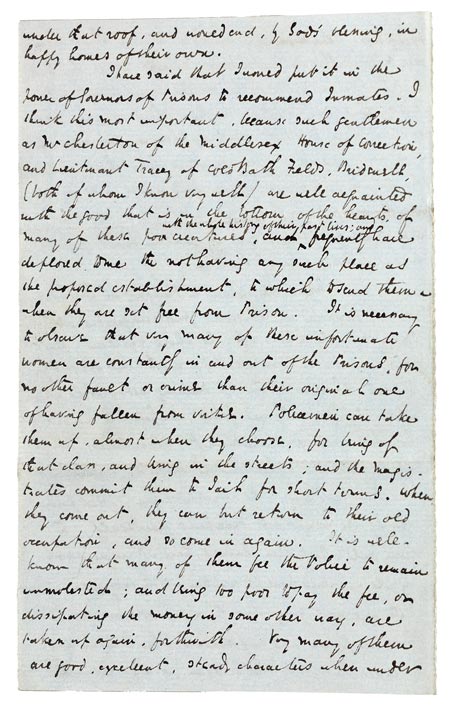
This letter is the earliest in which Dickens makes reference to the project to create a home for prostitutes and petty miscreants that would become Urania Cottage. Dickens's fourteen-page letter sets out in detail his hopes and plans for the institution: "A woman or girl coming to the Asylum, it is explained to her that she has come there for useful repentance and reform, and because her past way of life has been dreadful in its nature and consequences, and full of affliction, misery, and despair to herself. Never mind Society while she is at that pass. Society has used her ill and turned away from her, and she cannot be expected to take much heed of its rights or wrongs." Dickens never used the term prostitute in any of his letters.
Philanthropy
From 1840 Dickens guided the charitable work of philanthropist Angela Burdett-Coutts (1814–1906), the wealthiest heiress in Victorian Britain. Dickens served as her official almoner and helped to assess the merits of the thousands of letters she received from those seeking financial assistance. He also advised on her plan for improved sanitation in the slums of Westminster and drew her attention and support to the Ragged School Union, which provided education to London's poorest children. A pragmatist, Dickens encouraged Burdett-Coutts to direct her philanthropy toward the causes of distress. In 1847 they founded a home, Urania Cottage, in Shepherd's Bush, as a shelter for homeless women—prostitutes or petty criminals who sought to rehabilitate themselves by learning practical skills and developing self-discipline. Many of the women were assisted to eventually emigrate to one of Britain's colonies to begin a new life. For more than ten years, Dickens administered Urania Cottage on behalf of Burdett-Coutts and played an extremely active role in its day-to-day management.
under that roof, and would end, by God's blessing, in happy homes of their own.
I have said that I would put it in the power of Governors of Prisons to recommend Inmates. I think this most important, because such gentlemen as Mr. Chesterton of the Middlesex House of Correction, and Lieutenant Tracey of Cold Bath Fields, Bridewell, (both of whom I know very well) are well acquainted with the good that is in the bottom of the hearts, of many of these poor creatures, and with the whole history of their past lives; and frequently have deplored to me the not having any such place as the proposed establishment, to which to send them—when they are set free from Prison. It is necessary to observe that very many of these unfortunate women are constantly in and out of the Prisons, for no other fault or crime than their original one of having fallen from virtue. Policemen can take them up, almost when they choose, for being of that class, and being in the streets; and the Magistrates commit them to Jail for short terms. When they come out, they can but return to their old occupation, and so come in again. It is well-known that many of them fee the Police to remain unmolested; and being too poor to pay the fee, or dissipating the money in some other way, are taken up again, forthwith. Very many of them are good, excellent, steady characters when under
